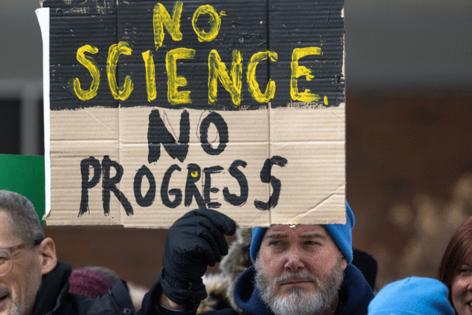Editorial: University funding should be reformed, not reduced
Published in Op Eds
Six months before World War II ended in Europe, President Franklin D. Roosevelt wrote a letter to his top science adviser. Could the wealth of technical knowledge developed for combat, he asked, spur the peacetime economy and improve public health? The resulting treatise, presented to Congress in 1945, established the nation’s commitment to funding university research.
Today, the federal government covers more than half of universities’ R&D spending, much of which flows through the National Institutes of Health. The agency spent more than $35 billion on almost 50,000 grants in 2023. NIH-funded research has supported lifesaving innovations from the hepatitis B vaccine and cancer therapies to MRI scans and gene-editing technology.
According to the current White House, drastic changes are needed to this system. Too much federal money is being wasted on “facilities and administration,” officials say, when it should be supporting research directly. Their basic criticism isn’t crazy. But their proposed solution threatens to impede essential scientific research without achieving its stated goals.
NIH grants are divided into direct and indirect costs. The former are expenses tied to a specific project, such as equipment and materials. The latter might include costs shared across various grant proposals — utilities at a lab, for example — but also expenses such as administrator salaries. The average so-called indirect cost rate, negotiated by universities and federal officials, has risen to 39% from a uniform 8% in the 1950s. At some schools, it’s more than 65%. (In practice, this means a $1 million grant is awarded an additional $650,000 for overhead.) More than a quarter of NIH funding dollars went toward indirect costs last year.
Some of the expenses covered by indirect costs are critical for the advancement of science. Others are more tenuous. Clerical staff and IT workers, parking lots and paint jobs — all can qualify as indirect costs. At some universities, meanwhile, administrators have started to outnumber faculty.
Sorting out essential expenses from administrative bloat isn’t easy. The painstaking rate negotiations between universities and the federal government attempt to do so, but they more often bog down the process and encourage school officials to inflate their needs. In theory, a flat rate would curb this perverse incentive, simplify the process, save money and thus free up funding for direct costs. (President Barack Obama’s administration considered a similar idea in 2012.) Better yet, a tiered system of flat rates would address discrepancies in costs by geography and type of research — an oft-cited reason for individualized rates.
It’s possible the administration had some version of this in mind when it proposed cutting the indirect rate to 15% last month, citing the standard for philanthropic grants. If so, it should’ve announced the policy in tandem with a commitment from Congress to increase funding and speed up the review process. (To qualify for grants, universities must show they’re compliant with dozens of rules.) Such a plan, gradually phased in to minimize chaos, might’ve resulted in a more prudent and transparent allocation of taxpayer funds.
Instead, by issuing so-called supplemental guidance, the White House circumvented Congress, which opposed a similar proposal in 2017. The administration has since been sued by 22 states and the cuts have been blocked. (The administration intends to appeal.) Universities, some of which stand to lose tens of millions of dollars annually, are preemptively reducing staff and putting clinical trials on hold. Suffice it to say, this isn’t the way to encourage American innovation.
A flat rate for indirect costs is a reasonable way to contain overhead and ensure that taxpayer funds support core research. But getting the details right, as any scientist will tell you, is essential. If it wants to ensure the U.S. remains the world’s leader in cutting-edge research, the administration should withdraw this heedless guidance and try again.
_____
The Editorial Board publishes the views of the editors across a range of national and global affairs.
_____
©2025 Bloomberg L.P. Visit bloomberg.com/opinion. Distributed by Tribune Content Agency, LLC.




























































Comments